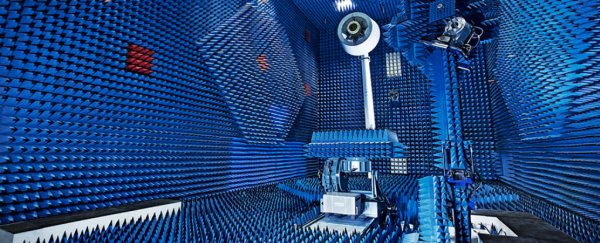You may think you know what peace and quiet sounds like, but you don't - not really. In fact, in the total absence of noise, the human brain can start inventing sounds of its own, because it relies so much on the audio cues we usually hear around us.
With that in mind, consider the new system developed by scientists at the Hong Kong University of Science and Technology, which is capable of absorbing almost all the sound that hits it - 99.7 percent of that sound, to be precise. The new set-up uses not one but two resonators, tuned to vibrate at whatever the frequency of the acoustic waves they're being hit with.
The problem with traditional approaches to sound absorption is that the sonic insulators used are composites designed to handle different frequencies of audio - building something that can cover every possible frequency is beyond the capabilities of modern materials, and thus no matter how good your home cinema set-up is, you're still going to get some sound leakage somewhere.
That's where the resonators come in. The first one is "impedance-matched" to the open air or whatever is surrounding the absorber - this provides a convenient route for sound waves to pass through. The second resonator is there to cancel out any scattered noise produced by the first, and it's this combination that achieves the 99.7 percent absorption level, no matter what the volume of the noise.
The new system is actually building on a previous experiment conducted last year by some of the same team. In that case, a thin absorbing material was used in conjunction with a hard reflecting layer, with the sound waves caught in the air between and silenced. The new approach follows a similar strategy, but uses a single layer of material.
The final report is available to read at Applied Physics Letters, though you'll need a strong head for physics to get through the details. "The net result is a perfect absorber that scatters no sound and that does not need a reflecting back wall… or another controlling wave," concludes the report. "Owing to its subwavelength dimensions, acoustic waves incident from any direction will be completely dissipated."
And speaking of sound-proofing, is 45 minutes really the longest anyone can stay in a perfectly silent, pitch-black room without going crazy? Derek from Veritasium investigates:

